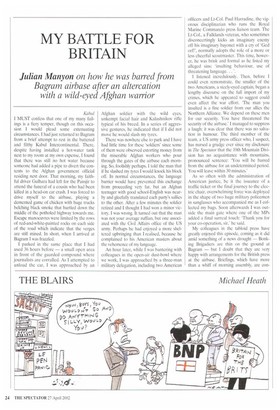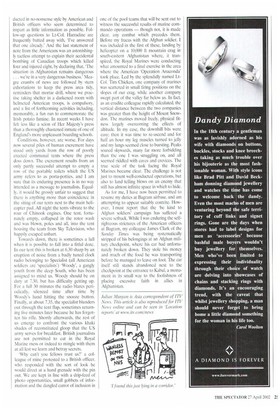MY BATTLE FOR BRITAIN
Julian Manyon on how he was barred from
Bagram airbase after an altercation with a wild-eyed Afghan warrior
Kabul I MUST confess that one of my many failings is a fiey temper, though on this occasion I would plead some extenuating circumstances, I had just returned to Bagram from a brief attempt to rest in the battered and filthy Kabul Intercontinental. There, despite having installed a hot-water tank next to my room at my own expense, I found that there was still no hot water because someone had added a pipe to divert the contents to the Afghan government official residing next door. That morning, my faithful driver Gulhara had left for the Pansjir to attend the funeral of a cousin who had been killed in a head-on car crash. I was forced to drive myself to the airbase, playing a demented game of chicken with huge trucks belching black smoke that hurtled down the middle of the potholed highway towards me. Escape manoeuvres were limited by the rows of red-and-white-painted rocks on each side of the road which indicate that the verges are still mined. In short, when I arrived at Bagram I was fraz7led.
I parked in the same place that I had used 36 hours before — a small open area in front of the guarded compound where journalists are corralled. As I attempted to unload the car, I was approached by an Afghan soldier with the wild eyes, unkempt facial hair and Kalashnikov rifle typical of his breed. In a series of aggressive gestures, he indicated that if I did not move he would slash my tyres.
There was nowhere else to park and I have had little time for these 'soldiers' since some of them were observed extorting money from the miserable Afghan workers who pour through the gates of the airbase each morning. So, foolishly perhaps, I told the man that if he slashed my tyres I would knock his block off, In normal circumstances, the language barrier would have prevented this exchange from proceeding very far, but an Afghan teenager with good school-English was nearby and gleefully translated each party's sallies to the other. After a few minutes the soldier retired and I thought I had won a minor victory. I was wrong. It turned out that the man was not your average ruffian, but one associated with the Civil Affairs office of the US army. Perhaps he had enjoyed a more sheltered upbringing than I realised, because he complained to his American masters about the vehemence of my language.
An hour later, while I was bantering with colleagues in the open-air dust-bowl where we work, I was approached by a three-man military delegation, including two American officers and Lt-Col, Paul Harradine, the vigorous disciplinarian who runs the Royal Marine Commando press liaison team. The Lt-Col., a Falklands veteran, who sometimes disconcertingly kicks an imaginary enemy off his imaginary bayonet with a cry of 'Ged orfr, normally adopts the role of a more or less cheerful scoutmaster. This time, however, he was brisk and formal as he listed my alleged sins: 'insulting behaviour, use of threatening language. ..
I listened incredulously. Then, before I could even remonstrate, the smaller of the two Americans, a steely-eyed captain, began a lengthy discourse on the full import of my crimes, which he appeared to suggest could even affect the war effort. The man you insulted is a fine soldier from our allies the Northern Alliance. We depend on these men for our security. You have threatened the security of the airbase.' I managed to suppress a laugh; it was clear that there was no salvation in humour. The third member of the team, a US army press officer who, I suspect, has nursed a grudge ever since my disclosure in The Spectator that the 10th Mountain Division has no acquaintance with mountains, pronounced sentence: 'You will be barred from the airbase for an undetermined period. You will leave within 30 minutes.'
As so often with the administration of American justice, be it the issuance of a traffic ticket or the final journey to the electric chair, overwhelming force was deployed in the shape of two huge military policemen in sunglasses who accompanied me as I collected my bags. Soon afterwards I was outside the main gate where one of the MPs added a final surreal touch: 'Thank you for your co-operation, sir,' he said.
My colleagues in the tabloid press have greatly enjoyed this episode, coming as it did
amid something of a news drought Bonking Brigadiers are thin on the ground at Bagram — but I doubt that they arc very happy with arrangements for the British press at the airbase. Briefings, which have more than a whiff of morning assembly, are con
ducted in no-nonsense style by American and British officers who seem determined to impart as little information as possible. Follow-up questions to Lt-Col. Harradine are frequently batted away with, 'I've answered that one already.' And the last statement of note from the Americans was an astonishingly tactless attempt to explain their accidental bombing of Canadian troops which killed four and injured eight, by declaring that, 'The situation in Afghanistan remains dangerous „ . we're in a very dangerous business.' Meagre crumbs of news are followed by stern exhortations to keep the press area tidy, reminders that mortar drill, where we practise taking shelter in a darkened room with helmeted American troops, is compulsory, and a list of forthcoming activities including, memorably, a fun run to commemorate the Irish potato famine. In recent weeks I have felt less like a scion of Her Majesty's press than a thoroughly chastened inmate of one of England's more unpleasant boarding schools.
Conditions, however, are worse. For days now several piles of human excrement have stood only yards from the row of poorly erected communal tents where the press doss down. The excrement results from an only partly successful attempt to empty a row of the portable toilets which the US army refers to as porta-potties, and I am sure that its enduring presence is in no way intended as a message to journalists. Equally, it would be grossly unfair to suggest that there is anything more than coincidence in the siting of our tents next to the main helicopter pad. All night the tents vibrate to the roar of Chinook engines. One tent, fortunately empty, collapsed in the rotor wash and was blown, poles and all, into the tent housing the team from Sky Television, who happily escaped unhurt.
Towards dawn, there is sometimes a lull when it is possible to fall into a fitful doze. In our tent this is broken at 6.30 sharp by an eruption of noise from a badly tuned clock radio belonging to Specialist (all American soldiers are 'specialists') 'Woody', a gangly youth from the deep South, who has been assigned to mind us. Woody should be on duty at 7.30, but has difficulty getting up. For a full 30 minutes the radio blares periodically, silenced time after time by Vv'oody's hand hitting the snooze button.
Finally, at about 7.35, the specialist blunders out through the tent flap, sometimes return ing five minutes later because he has forgot ten his rifle. Shortly afterwards, the rest of us emerge to confront the various khaki shades of reconstituted gloop that the US army serves for breakfast. British journalists are not permitted to eat in the Royal Marine mess or indeed to mingle with them at all lest we learn and betray secrets.
'Why can't you fellows trust us?' a colleague of mine protested to a British officer, who responded with the sort of look he would direct at a hand grenade with the pin out. We are kept in line with a drip-feed of photo opportunities, small gobbets of information and the dangled carrot of inclusion in one of the pool teams that will be sent out to witness the successful results of marine commando operations — though not, it is made clear, any combat which precedes them. Before my fracas with the Afghan soldier, I was included in the first of these, landing by helicopter on a 10,000 ft mountain crag in south-eastern Afghanistan where, it transpired, the Royal Marines were conducting what amounted to a final exercise in the area where the American 'Operation Anaconda' took place. Led by the splendidly named LtCol. Tim Chicken, one company of marines was scattered in small firing positions on the slopes of our crag, while another company swept part of the valley far below us. In fact, as an erudite colleague rapidly calculated, the vertical distance between the two companies was greater than the height of Mount Snowdon. The marines moved freely, physical fitness largely overcoming the effects of altitude. In my case, the downhill bits were easy; then it was time to re-ascend and for half an hour my leg muscles turned to jelly and my lungs seemed close to bursting. Peaks soared skywards, many far more forbidding than the one I was struggling on, and all seemed riddled with caves and crevices. The true scale of the task facing the Royal Marines became clear. The challenge is not just to mount well-conducted operations, but also to land telling blows on an enemy that still has almost infinite space in which to hide.
As for me, I have now been permitted to resume my duties at Bagrarn airbase, and am attempting to appear suitably contrite. However, I must report that the 'be kind to Afghan soldiers' campaign has suffered a severe setback. While 1 was enduring the selfrighteous strictures of the American officers at Bagram, my colleague James Clark of the Sunday Times was being systematically stripped of his belongings at an Afghan military checkpoint, where his car had unfortunately broken down, They stole his money and much of the food he was transporting before he managed to leave on foot. The car itself still stands abandoned next to the checkpoint at the entrance to Kabul, a monument in its small way to the foolishness of placing excessive faith in allies in Afghanistan.
Julian Manyon is Asia correspondent of ITV News. This article is also reproduced for ITV News online and can be seen in 'Location reports at www.imcominews



































































 Previous page
Previous page